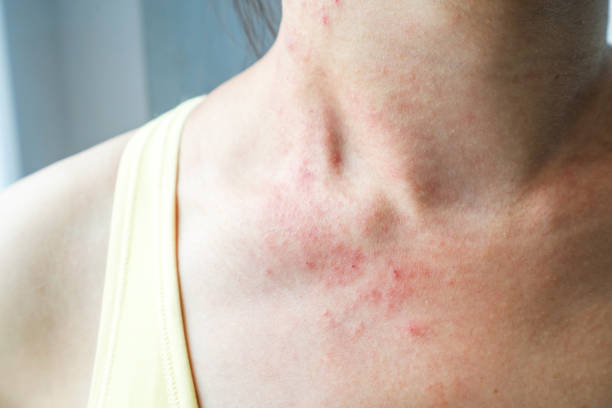If you suffer skin sensitivity from sun exposure, the sun is not your problem: your liver, colon, lymphatic system and kidneys are your problem. They are not doing a good job, for whatever reason, detoxifying your body. It could be due to chronic constipation, gallstones in the gallbladder, lack of bile flow, unbound iron in the blood, metabolic wastes and dead cellular debris building up in the lymphatic system. It could also be chronic nutritional deficiency. It could be heavy metals such as aluminum, cadmium, mercury or lead. It could even be the very minerals and vitamins meant to nourish your body, acting as toxins. However, the cascade almost always starts with gallstones originating from the liver clogging up the gallbladder and obstructing bile-flow.
If you are not moving your bowels everyday, undigested food will rot, and toxins will build up. These undigested food releases putrefying toxins in the bloodstream, then the tissues and organs. If the body is unable to digest food protein, for example, it will store it as collagen fiber in the blood vessel walls. If it is unable to store as such, then this protein is converted into nitric-, sulfuric- and phosphoric- acids — similar to battery acid. Your body then becomes more acidic, creating an ideal environment for pathogens. If you have chronic constipation, you must increase your vitamin B1 level, until problem is resolved.
Many people with this condition will discover that they may have low vitamin D levels. If you do have a low vitamin D problem, what that really means is that you have a low magnesium and high calcium problem. Please read that again. The vitamin D in your body is actually keeping low on purpose to save you from calcium toxicity, and magnesium deficiency. Your body is inflamed internally. What you really need to do is increase your magnesium level. In fact, the root of depression is an imbalance between the calcium/magnesium ratio.
Okay, your skin is reacting to the sun, even though the sun is supposed to be a natural healer. The reason for your rashes is because your liver is no longer able to detoxify toxins efficiently, causing your blood and lymphatic system to become “polluted.” These pollutants/toxins then lodge in the basal wall membrane of your capillaries, depriving your skin of oxygen and nutrients.
Your skin essentially can’t “breathe” because of these toxins clogging it. Ideally, the sebaceous glands in your skin produces a fluid called sebum. This fluid nourishes the hair follicle and adds luster to the hair. It also serves as a natural anti-pathogenic agent for the skin. The lack of it will hasten dry, sensitive skin.
Here’s also what I would do in order of importance to help heal a sun sensitive skin — these may work for other skin conditions such as acne, psoriasis, etc:
- Wild Siberian chaga
- Guduchi
Add 1/4 teaspoon each of these in hot water… Or boil them for an hour or so. Sip hot in a thermos throughout the day. I personally do this three times per week. Discard the sediment that settles on the bottom. Wild Siberian chaga is better than any other type. Both guduchi and chaga heals the liver. - Manjistha: this herb WILL unclog any congestion in your entire lymphatic system. Red root is also another good herb for this. I use them often, when needed.
- Magnesium glycinate/malate 400mg daily. These absorbable forms of magnesium will increase your vitamin D3 level EVEN if you stop supplementing on D3.
- Grass-fed/grass-finished (organic) liver. This contains natural vitamin A, B12, choline, iron, folate, zinc, copper. Consume 4 to 6 ounces about once per week — even if you are vegan/vegetarian. You can also buy desiccated grass-finished liver online.
- Atlantic oysters. These contain ideal levels of copper, zinc and selenium. Try this also once per week.
- Organic bee pollen. This contains natural B vitamins and copper. Taste test on your tongue first to make sure you’re not allergic. Natural vitamin B is needed for so many things.
- Natural vitamin C found either in amla or acerola. I consume these supplements almost everyday. They heal damaged, oxidized tissues.
- Try to donate about 1 liter of blood once every six months to a year. You are iron toxic. Iron toxic means you have a lot of unbound iron, acting as a heavy metal or free radical, destroying your tissues. Unbound iron is not attached to hemoglobin, or anything, like it should be. Glaucoma is an iron toxicity problem. Unbound iron has an affinity for lodging itself in the liver, and destroying it, and causing skin problems.
In summary, to alleviate skin rash caused by sun exposure to the skin:
– Be sure to be moving your bowels daily ( Vitamin B1 helps)
– Try chaga/guduchi tea for its whole-body healing effect
– Try manjistha for your lymphatic system
– Try magnesium to reduce inflammation
– Eat grass-fed/finished liver once per week for its rich mineral content
– Eat oysters once per week
– Try organic bee pollen for its copper and B vitamin content
– Try natural vitamin C (amla/acerola) for wound healing and nourishment
– Donate blood once or twice per year.
Update:
I’ve recently discovered another herb that appears to possess protection against the effects of Sun-induced damage, specifically against Ultraviolet-induced damage to the skin, when taken orally. Skin damage was reduced from both UVA and UVB radiation. That herb is called polypodium leucotomos.
It is also said to be effective against some cases of psoriasis, while also boosting the immune system.

